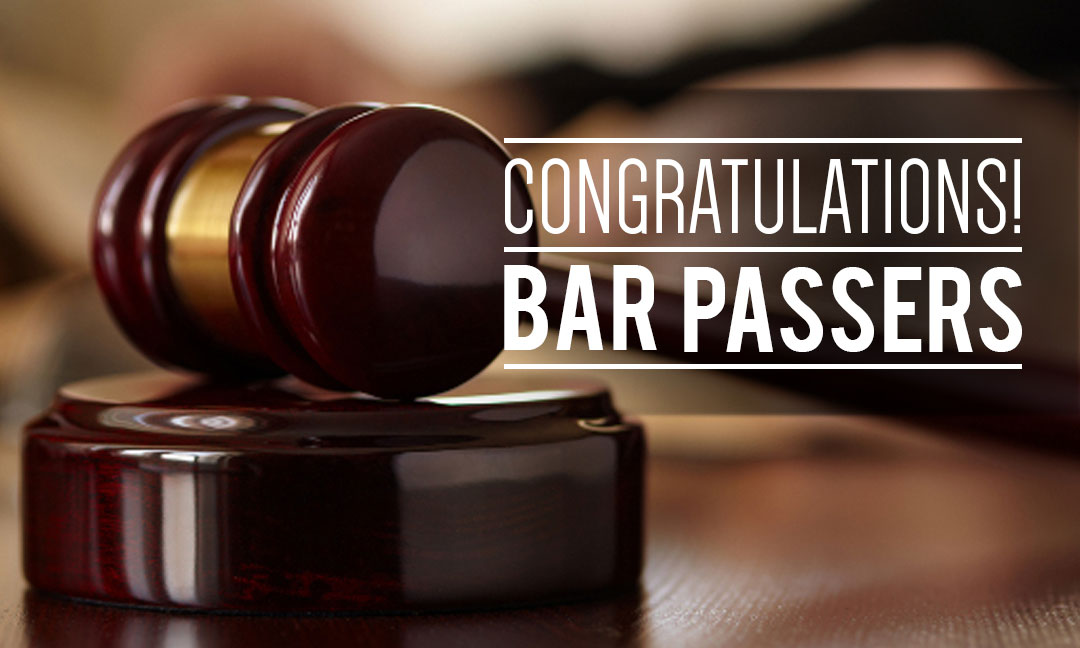
Bar Exam Advice from a 2018 Bar Topnotcher
By Atty. Ervin Dy
1st Question to ask yourself: Will I enroll in a bar review center?
Pros: There is a structure and outline immediately prepared for bar review. These people are in the business of producing bar passers.
Cons: The review center may not be tailor-fit for what you need to review. (ex. Classes are on labor law na master mo na and you want to start sa tax kung saan mahina ka). Also, your pace may be different with other peoples and the review center.
Even before graduation, I decided I would self-review.
2nd Question: What materials will I use for bar review?
There is no "best" reviewer but always have for guidance the bar syllabus.
I ended up using the following authors for my first reading:
Political Law - Carlo Cruz
Labor Law - Azucena
Civil - Codal
Tax - Ingles
Commercial - Sundiang
Criminal - Boada
Rem – Tranquil, Codal
Ethics - UP reviewer
Next is to prepare your schedule. You will realize when you are a full-time bar reviewee that you will have a lot of free time because it is impossible to study the whole day. What my fellow bar takers did was to make a bar calendar detailing up to bar month what they will do. Me I followed a daily schedule (E.G. 10pm-6am sleep, 6-7am breakfast)
Kasi wala pa akong idea what to plan ahead. My approach was to go through everything first reading all the subjects in order.
Physical fitness and health are important for bar preparation because it’s hard to get sick and catch up after. That's why I incorporated 1 hour per day for workout/exercise. Maintaining a daily schedule helps in training and disciplining your body so that it is 2nd nature to wake up early and move even when you lack motivation.
In June and July, I would read 8-9 hours a day. I finished quickly the first reading but after, I was burnt out.
As in wala nakong gana magaral at wala ng pumapasok sa utak ko. So nung buong August hindi ako nagreview. Nanood lang ako ng mga movies.
Again, the pacing is important, you really have a lot of free time, you don’t have to overwork yourself at the start. The most crucial period is actually pre-week so that you peak by November and you can sustain it the whole month, rather than peaking early and burning out.
In September there was a free mock bar for UP grads. This time I used UP Bar Operations Commission reviewers as my final reviewer because it was prepared based on the bar syllabus.
So I used this opportunity to simulate the pre-week. So for example first week of mock bar political and labor I read the UP reviewer and made my personal marginal notes if anything was lacking. My rule of thumb was Tuesday Wednesday for afternoon subject, then Thursday Friday for morning subject. Mondays and Saturdays were for resting.
So for the whole month of September, that was my second reading.
Lastly, for October I would read recent jurisprudence which is very important because there are really questions that are case-based and it’s hard to come up with answers without any basis.
During bar month, that was my 3rd reading which was the same as my simulation of pre-week. This time it was faster as I was using the same reviewer (UP BOC w/ personal notices). I no longer read the weeks.
For exam-taking tips, there are a lot such as handwriting, margins, spacing, structure, issue spotting, etc. I can’t really explain it all properly here. But I also dedicated time, though distributed, to read previous bar Q&A and the suggested answers provided by UP Law Center.
With regard to news about the examiners, there is a point to focus on them but not exactly that you study only their materials but more on spending time studying their favorite questions. It’s same as in law school if you have a sample exam, it’s faster and more confident to answer because the question is familiar.
As to last-minute tips, I only read the ones prepared by my frat. Because by November, you should be confident already and the last-minute tips are only safety and reassurance. Don’t panic if you read something you don’t know. Just be confident and know na kaya mo nang mambola sa dami mong binasa. You can always use general principles in answering.
These are just an overview of tips. The biggest hurdle to overcome is the fear of the unknown because we were not specifically trained for the bar exams. Lahat ng first takers kakapa pa talaga yan. Do not compare yourself to other takers because we each have our own pacing. Even if you are faster or slower relative to someone, it is irrelevant because most probably he also doesn’t know what he is doing. The best advice you can get is from someone who has experienced it.
In the end, the bar exam really is a personal battle.
Atty. Ervin Dy placed #17 in the 2018 Bar Examinations. He was a consistent member of the honor society in the UP College of Law. He currently works at Poblador, Bautista, and Reyes Law Offices.
Digest.ph
AIC Grande Tower Garnet Road
Ortigas Center, Pasig City
Metro Manila Philippines
Mobile No. +639451244898
digestph@gmail.com
